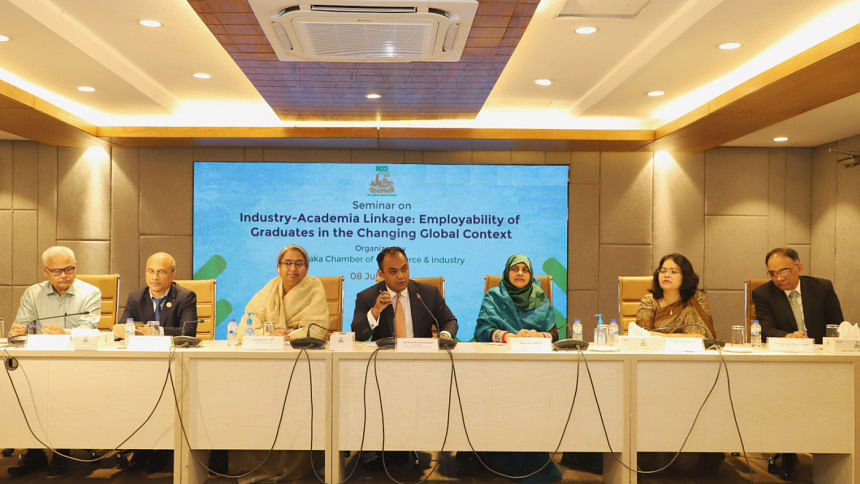Strong industry-academia linkage will plug skills gap

Around $8 billion to $10 billion is remitted from Bangladesh each year as salaries paid to foreign workers in absence of skilled manpower resulting from the lack of a quality education system in the country.
Sameer Sattar, president of the Dhaka Chamber of Commerce and Industry (DCCI), made this comment while speaking at a seminar, styled "Industry-Academia Linkage: Employability of Graduates in the Changing Global Context".
The event was organised by the DCCI at its office in Dhaka yesterday.
Sattar stressed on creating skilled manpower in the country so that Bangladesh can save this valuable outward remittance.
"Industry-academia linkage is instrumental in creating a skilled and industry-oriented workforce," he said.
"It makes a workforce ready with a specialised skillset for relevant industries, but the linkage has still not been fully developed due to our conventional educational system," Sattar added.
It is very important to focus on the industry-academia linkage in order to take full advantage of Bangladesh's demographic dividend
He also said the absence of industry-academia harmony results in an increasing skills gap in the workforce.
Besides, it is very important to focus on the industry-academia linkage in order to take full advantage of Bangladesh's demographic dividend, he added.
The DCCI president called for conducting joint research and development activities, developing education infrastructure, creating a national employment database, arranging need-based curriculum design and skills training as well as strengthening technical and vocational education systems.
Education Minister Dipu Moni stressed the need for soft skills, re-skilling and up-skilling, teamwork development, technology adaptation, changing mindset, demand mapping and expediting technical and vocational education and training.
She informed that the present enrolment rate in the technical and vocational education system is 17 per cent.
"The diversification of education is more important, it will not be the right decision to attract our students only to the medical or engineering education system," the minister said.
Prof Satya Prasad Majumder, vice-chancellor of the Bangladesh University of Engineering and Technology, said industries should come forward with more research and development with their own investment.
Nasreen Afroz, executive chairman of the National Skills Development Authority (NSDA), said they are keen on creating skilled manpower for export.
A "Skills Qualification Framework" has been formed under the chairmanship of the education minister. A total of 14 skills development councils have been formed already, she added.
Afroz expressed hopes that the relation between industry and academia will be developed in future.
She also requested industry leaders to arrange such workshops and seminars incorporating relevant stakeholders.
The NSDA has been arranging funding from the Human Resource Development Fund of the finance ministry for those involved in conducting skills development training, Afroz said.
During the keynote presentation, Sayema Haque Bidisha, a professor of economics at the University of Dhaka, highlighted that one of the challenges of the domestic labour market is the absence of strong linkage between supply and demand, primarily between academia and industry.
To address the skills mismatch, strong industry-academia linkage is needed, she said. Prof Mohammad A Momen, director of the Institute of Business Administration at the University of Dhaka, stressed on developing need-based curriculum, enhancing IT infrastructure, offering skills training and adopting industry-specific programmes.
The participation of women in the country's industrial sector is very low, he added.
Momen urged to reduce their dependency on foreign workers in different companies in Bangladesh.
Syed Nasim Manzur, managing director of the Apex Footwear Ltd, requested for private sector representation in the development process of curriculum to ensure quality education.

 For all latest news, follow The Daily Star's Google News channel.
For all latest news, follow The Daily Star's Google News channel. 



Comments